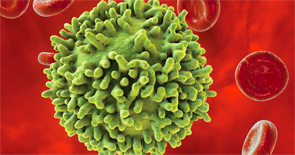
Antibody-producing cell. B-lymphocyte or T-lymphocyte in blood with red blood cells.
Kateryna Kon/shutterstock.com
The serine-threonine protein phosphatase 2A (PP2A) enzyme is critical for regulatory T cells to function—without it, they don’t have the ability to suppress effector T cells and can’t protect against autoimmunity, according to new research published in Nature Immunology.
Researchers found that conditional knockout mice—in which PP2A expression is knocked out only in regulatory T cells—developed a severe lymphoproliferative disorder affecting just about every organ. The findings—the latest layers of the onion peeled away in the lab of George Tsokos, MD, chief of the Rheumatology Division at Beth Israel Deaconess Medical Center, Boston—offer a potential new target for the treatment of systemic lupus erythematosus.
Dr. Tsokos says the findings bring critical new insight into how regulatory T cells do the job of regulating the immune system.1
“In this paper, we saw that it is one enzyme, one phosphatase, that is absolutely needed for the regulatory T cell to be functional,” he says. “And we understand the molecular underpinning for the good function of regulatory T cells.”
PP2A is known to regulate key cellular processes, such as cell-cycle progression, apoptosis, cellular metabolism and migration, and is involved in the development of cancer and neurodegenerative diseases, as well as SLE.
The new understanding about the enzyme is another piece of the puzzle in the complex pathogenesis of SLE, Dr. Tsokos says. Genome-wide association studies have identified genetic susceptibility to the disease and identified more and more people in whom a deficiency in a single gene is responsible for expression of SLE. Smoking, sun exposure and other environmental factors have an epigenetic influence. Hormones clearly play a role, as well, he adds—nine out of 10 people with SLE are women—although the role of hormones is not very well understood.
And then there is abnormal immune regulation.
“All these factors contribute to the expression of the disease, and I would say they act either serially or all together, and in each patient, these factors contribute differentially,” Dr. Tsokos said. “One patient may have more genetic, another patient more epigenetic and so on and so on. … All of these factors acting together generate what I call ‘common effectors of the immune response’: autoantibodies, immune complexes, autoreactive T cells and pro-inflammatory cytokines.” Additionally, he says, organ-specific factors determine which organ will be subject to inflammation and damage.
Long-Term Research
Researchers in Dr. Tsokos’ lab are interested in identifying molecular abnormalities in the immune system and in the organs and then trying to specifically target them. They have been studying T cells in SLE for more than three decades.
